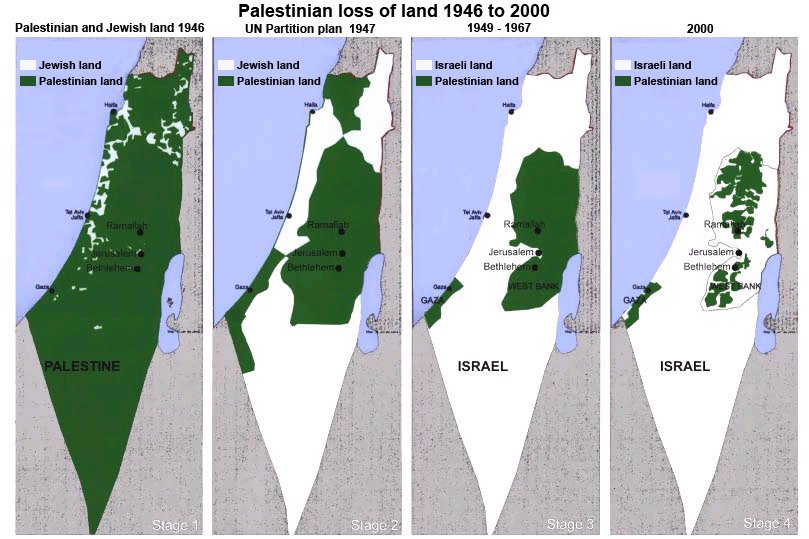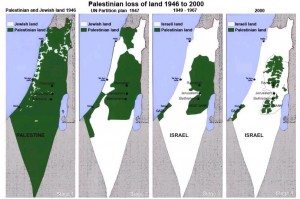Peace in Israel/Palestine? By Mark Rich
Why do we expect politicians to make just peace?
In honor of the Prince of Peace, I have been called upon to review of the prospects for peace in Israel/ Palestine. Suppressing simultaneous urges to laugh and to cry hysterically, I accept the challenge.
After 54 years of existence on this terrestrial ball, I’ve learned that expecting politicians to arrive at a just peace is like handing an I-Pod to a monkey in the expectation that he/she will use it correctly. The monkey just can’t do it. So why do we expect politicians to make just peace? We are almost guaranteed failure when we put the powers of war into the hands of mere human beings and then also expect those same humans to achieve peace that is more than the cessation of war.
In an odd way that failure is especially sharp in Israel/Palestine. It is a land where two opposed hopes meet more clearly than anywhere else: divinely-validated nationhood (established with what appears to some to be divinely-sanctioned violence) against divinely-mandated justice concerning land. All of those are in play in Israel/Palestine. In the presence of so much divine power going in so many directions, politicians should perhaps be forgiven for their incompetence. Divine power cannot help being intoxicating to humans who so much desire worldly power.
Can the Prince of Peace bring light to this moral miasma? Of course he does. This light is of two sorts.
First, his crucifixion and resurrection establish the nature of divine power. This power is opposed to all human power that is coercive and oppressive, “the god of this world” as Paul puts it (2 Cor. 4). By Jesus’ confrontation with the forces of fear, greed, and hatred – the supposedly divinely-sanctioned rulers of the time – and his consequent crucifixion followed by his shocking resurrection, Jesus shows that God’s power has nothing to do with the power of death except to subvert it, to cancel its power and authority, along with the power and authority of those who wield such power. Any humans who gain their authority through the use of death have automatically forfeited their right to claim divine sanction for their authority.
Hence Jesus’ explication and authorization of rightful human authority: “You know that among the Gentiles those whom they recognize as their rulers lord it over them, and their great ones are tyrants over them. But it is not so among you; but whoever wishes to become great among you must be your servant, and whoever wishes to be first among you must be slave of all” (Mk 10:42-44). The only justification for those who govern to have power over others is that they use it solely in the service of those they govern. Neither the divine right of kings nor the more modern (and quite American) notion of manifest destiny can meet this standard. The specific form of government is less important than the moral rule that the rulers must exist to serve the ruled.
Jesus’ resurrection has implications for land ownership.
Second, Jesus’ resurrection has a specific significance for land ownership and control. Jesus taught that all possessions are to be shared among his followers (not counting spouses as possessions!). This sounds radical, and in one sense it is so, but it is also a return to the original property dispensation of Genesis 1:28: joint tenancy (but not ownership) of the whole earth by the whole human race. Through Jesus’ crucifixion God cancels the system by which we humans are held in thrall to fear, greed, and hatred. Through Jesus’ resurrection God begins to re-establish God’s own active ownership of the whole earth, beginning the new creation in which only God’s good power reigns. The ancient system of dividing the earth among the nations and then fighting over it – what John Mearsheimer calls “the tragedy of great power politics” – is canceled by God. It becomes part of our and Satan’s past, not our and God’s future.
The ceaseless struggle between governments, companies, and extremists in Israel/Palestine over control of the land, including paradigmatic control over the Temple Mount, has in one sense nothing to do with God in that God is not on either side in the conflict. God is merely the excuse for what are really their own interests. But in another sense God has everything to do with it because all of these people have been created by God to live upon God’s earth in faith, hope, and love instead of fear, greed, and hate.
One might object to these arguments that these are all fine Christian arguments, but one cannot expect Jews and Muslims to agree to them, let alone follow them. So what realistic point is there to these arguments?
God’s arguments
First, the arguments above are not Christian arguments, they are God arguments. I do not say that this is what Christians teach, although I think they should. Most Christians are too ignorant to even know these arguments, let alone teach them. There are many Christians who gladly support the god of this world in his so-called realpolitik, in his wars and greed and fear. Some biblical literalists do a lot to give a veneer of divine approval to this state of affairs. My arguments above were not that this is what Christians think. I am saying that this is what God is doing.
Second, God’s realpolitik of resurrection is far more real than that of this world. It is finally the only thing that really works. The peace of Israel/Palestine cannot be achieved unless the main parties see that they must in the end share the land in which God has given them all tenancy, just as in the end the whole human race must share tenancy of the whole earth.
Whether that tenancy is exercised in one state or two is not ultimately important. More important, once again, is whether the rulers exist to benefit those they govern or to benefit themselves and their friends.
It is the vital role of Christians, whether residing inside or outside Israel/Palestine, to insist upon the politics of faith, hope, and love in the face of the politics of fear, greed, and hate. Politicians can’t do that on their own power. There are already Jews and Muslims pursuing those politics in the face of political opposition and media ignorance. It is in our calling to join them with all the power of the resurrection.
Noushin Framke and Marlin Vis join the conversation on Wednesday.



Pingback: Tweets that mention Peace in Israel/Palestine? By Mark Rich | Ecclesio.com -- Topsy.com